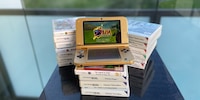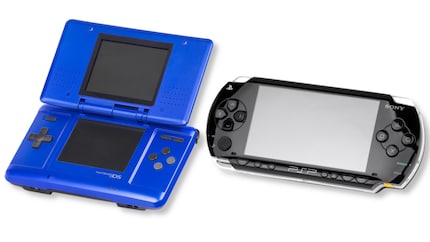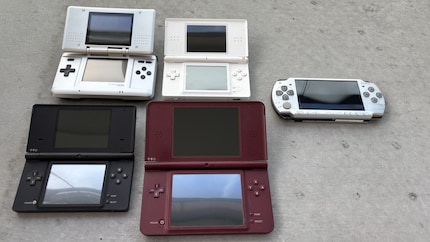
Guide
Nine reasons why the Nintendo DS is far from obsolete
by Cassie Mammone

The Nintendo DS came onto the market 20 years ago. Since then, the handheld with two screens has sold over 154 million units. I'll tell you what's behind its success and how it has left the competition far behind.
Before the Nintendo DS became the most successful handheld of all time, strong winds blew against it. For example, in the form of the PlayStation Portable (PSP), which looked much more promising in 2004. To boost sales, Nintendo came up with an idea that would later prove to be a stroke of genius.
Contrary to the tradition of all previous hardware launches, the Japanese company sold the handheld first in the USA and only later in Japan. The reason for this was Black Friday. Nintendo was keen to launch the DS on the highest-selling day of the year. The calculation worked out: The DS sold over a million units within the first month, 500,000 of them on the Black Friday weekend alone. It was the beginning of a long-lasting wave of success.
With the Switch hybrid console, Nintendo is now showing just how innovative the company is. Things were different in 2004. With the various Game Boys, Nintendo only had classic handhelds on sale that worked like older consoles.
More than six months before the release of the Nintendo DS, documents are leaked that reveal many technical specifications and lead to wild rumours. For example, that the two screens of the DS would lie on top of each other to create a 3D effect. A feature that would only become a reality seven years later with the Nintendo 3DS.
The wild rumours are fuelled by statements from Nintendo, because the then Nintendo President Satoru Iwata promises a device that is based on a completely different concept than all previous gaming devices. A device that is "different". The more conservative PSP, which is supposed to have more to offer in terms of technology, seems more attractive. Despite this, the Nintendo DS has sold almost twice as many units.
The most important launch title was probably "Super Mario 64 DS". The game proves that the DS, like the previous Nintendo handhelds, can be a kind of mini-N64. In fact, the DS is much more than that. In the years that followed, the new handheld spawned high-calibre spin-offs of classic Nintendo series, such as "Mario Kart DS", "New Super Mario Bros.", "Pokémon Diamond and Pearl" and "Kirby: Mouse Attack".
In addition, Nintendo has ventured a successful experiment or two - even with its most important franchises, such as "The Legend of Zelda: Phantom Hourglass". The classic "Zelda" with a bird's eye view is not only controlled in a completely new way using a touchscreen, but also makes creative use of functionalities such as the microphone or the foldable screens. Other games that go in a similar direction are "Metroid Prime Hunters" and "Pokémon Ranger".
With a broad and good selection of games, the core audience of Nintendo fans is duly catered for. The competitor PSP also has some game gems from established franchises to offer, such as "GTA: Liberty City Stories", "Gran Turismo" or "Ratchet & Clank: Size Matters". The reason why the DS has raced past the PSP in terms of sales figures does not lie with the core audience.
There aren't that many classics among the best-selling DS games. With "New Super Mario Bros.", a traditional "Super Mario" platformer is in the lead - with over 30 million units sold. Already in second place, however, is "Nintendogs" with just under 24 million sales, which was released shortly after the DS itself and has picked up many players - including me.
"Nintendogs" was produced by "Super Mario" father Shigeru Miyamoto. Basically, the game is a puppy simulation. You choose an animal at the start of the game, feed it and then take it for a walk. You can train your dog in the park, the training hall or at home to win the gold medal in competitions. There is no real goal. "Nintendogs" is not designed for you to sit purposefully in front of the DS to play through it as quickly and well as possible. Instead, you can occasionally insert the cassette into your device and relax a little with the cute puppies. The key word is: occasionally.
Following on from "Nintendogs", there are many other titles that you can take out for a quick spin. With "Dr Kawashima's Brain Jogging", you can test your mental age with tricky brain teasers, while "Professor Layton and the Mysterious Village" is for puzzle lovers who want their puzzles wrapped up in an exciting story. "Animal Crossing: Wild World" is already attracting over 10 million players in 2005 to settle down in a village with animal neighbours.
It is precisely these casual games that are the reason for the immense success of the Nintendo DS. The first iPhone was released in 2007. Years earlier, the DS tapped into a new audience that would later also occasionally play on smartphones - and still does today. In the year 2022, the mobile market will generate more revenue than the console and PC markets combined.
Involving casual gamers brings Nintendo success both in the 2000s and with the Nintendo Switch. The Wii was the first console to be released after the DS and pursued the same strategy: instead of hardcore gamers, it was aimed at families playing games together in front of the TV. Technically impressive performance gives way to the innovative Wii remote control. Adverts like these show that the Nintendo DS can be taken out at any time:
Before the Wii cleaned up the console market with sensor control, the DS impressed with its functions. These include a microphone, wireless functionality and, above all, two screens, one of which can be operated via touchscreen.
In addition to the new audience, innovation is probably the reason why the technically inferior DS is overtaking the competing PSP.

In the years following the first release, further DS models appeared. They usually iron out the weaknesses of the predecessor model or add new functionalities. For example, the DS Lite, released in 2006, is more compact than the classic DS and also has a longer battery life. In 2008, the DSi introduces a camera and an online shop on the handheld - but it is the first model to do without the GBA slot. In 2009, the DSi XL is the last model of the handheld to be released, which - as the name suggests - is a DSi with a larger screen.
In the DSi era, however, the handheld slowly runs out of steam, leading to the release of the Nintendo 3DS on 26 February 2011. Nevertheless, it took another three years before production of the devices was discontinued. The last official DS game, "Big Hero 6: Battle in the Bay", was also released in the same year. Overall, the Nintendo DS has a remarkable lifespan of ten years.

While the Nintendo DS was initially viewed with scepticism due to its unusual functions, these contributed significantly to its success. The games, which appeal to both die-hard gamers and casual gamers, also benefit from the new features of the device, especially in a time before smartphones became part of everyday life.
Nintendo is enjoying a ride of success with the Nintendo DS, which continues to gather pace with the release of the Wii. After that, the Wii U shows just how low the company can sink and even the 3DS cannot carry Nintendo alone in a post-smartphone era. Salvation comes in the form of the Nintendo Switch in 2017, whose replacement by the Switch 2 we eagerly await in 2025
I wrote my first text about video games when I was eight years old. I haven't been able to stop since. The rest of my time is spent on my love for 2D husbandos, monsters, my cats and sport.
Interesting facts about products, behind-the-scenes looks at manufacturers and deep-dives on interesting people.
Show all